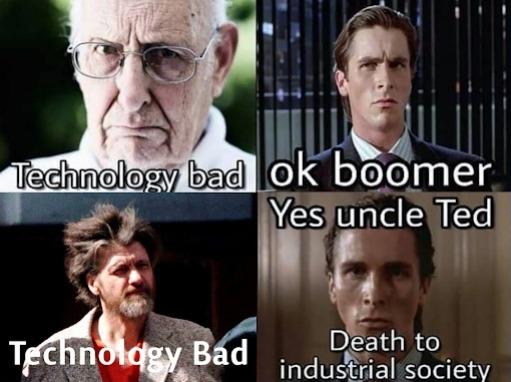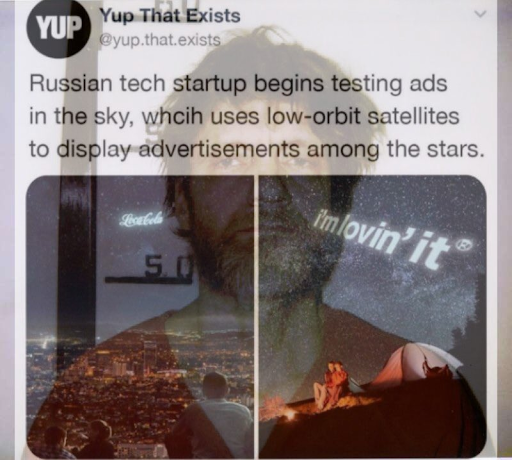
From Manifesto to Myth: Uncle Ted’s echo in the age of climate crisis and information overload
In the age of rapid technological development and climate change concerns, society finds itself grappling with its complex relationship with technology and the environment. In hushed corners of the internet, slowly bleeding into the mainstream, arises an unlikely icon for those accusing against the perceived dangers of modernity.
Theodore Kaczynski, also known as the Unabomber, used to be a symbol of domestic terrorism. From the late 70s until the late 90s, the Unabomber terrorised America with a series of mail bombs that “killed three Americans and injured nearly two dozen more” (FBI, 2022). He earned the moniker of “Unabomber” because he would target universities and airlines. In recent years, though, he’s come to be affectionately known as Uncle Ted.
In 1995, the Washington Post published Kaczynski’s 35,000-word manifesto on the condition of Kaczynski stopping the bombings (Wendigoon, 2023). The manifesto, named Industrial Society and Its Future, critiqued modern technological society, addressing issues of industrialisation and the loss of human freedom and justifying his acts of terrorism under the fake group called “Freedom Club”. The manifesto would start and shape many discussions about modernity and technology in the years to come.
With climate change worsening and policies not doing enough to reverse the damage, some spheres online have turned public discourse back to Kaczynski’s anti-technology stance as a response to contemporary concerns about climate change and information overload. The Uncle Ted figure rises from these spheres as a champion for those questioning the unchecked growth of technology in their quest for authenticity and reconciliation with nature. Despite their criminal origins, Kaczynski’s ideas persist in public discourse today about technology's impact on society and nature.
Following the rise of Uncle Ted memes online, this paper will explore the Unabomber’s influence on online discourse about modernity and technological developments, how his anti-technological sentiment translates in the age of climate crisis and information overload, and how that increasingly shared sentiment leads to online communities mythologising the Uncle Ted figure (See Figure 1).

Figure 1: Kaczynski meme: Patrick Bateman calls an old person a boomer for stating that technology is bad but agrees when Uncle Ted says the same thing.
Authenticity in the Age of Technology
Kaczynski lived as a monk who had retreated to a cabin in the mountains of Montana (FBI, 2022) to reconnect with nature. This urge to reconnect with nature and critique modernity is not a novel one. Henry David Thoreau did the same and documented his experience in his book Walden (1854). In it, Thoreau critiques modern society for what it has become, emphasising the need for simplicity and a return to nature.
Thoreau criticises what he deems to be the excessive development of technology, calling such technological advancements “pretty toys, which distract our attention from serious things” (Thoreau, 1854). He says that there is no need for more advancements as “[t]hey (new inventions) are but improved means to an unimproved end, an end which it was already but too easy to arrive at” (1854). He asserts that “[o]ur life is frittered away by detail” (1854), to the extent that people can no longer rely on themselves. As such, Thoreau passionately calls for “Simplicity, simplicity, simplicity!” (1854).
To Thoreau, simplicity comes with a return to nature. Criticising how quick people are to be inconvenienced, he invites us to live authentically and “spend one day as deliberately as Nature, and not be thrown off the track by every nutshell and mosquito’s wing that falls on the rails. Let us rise early and fast, or break fast, gently and without perturbation; let company come and let company go, let the bells ring and the children cry,—determined to make a day of it” (Thoreau, 1854). Indeed, why should we “knock under and go with the stream” (1854)?
Purposefully or not, Kaczynski comes to similar conclusions in his manifesto; he memorably starts his manifesto by saying “[t]he Industrial Revolution and its consequences have been a disaster for the human race” (Kaczynski, 1995, 1). The manifesto, which will be discussed later, goes into similar critiques of modernity yet the call for authenticity is a violent and individualistic.
In his book, The Ethics of Authenticity (1991), Charles Taylor critiques this individualistic mindset in people’s quest for authenticity and discusses the tension between individuality and societal expectations. The ethics of self-discovery, he suggests, must be taken into consideration as the contemporary culture of authenticity “encourages a purely personal understanding of self-fulfilment, thus making the various associations and communities in which the person enters purely instrumental in their significance” (Taylor, 1991, p. 43).
Interpersonal relationships are important to Taylor. He suggests that the general feature of human life is its “fundamentally dialogical character” (Taylor, 1991, p. 33), thus self-improvement and self-fulfilment are partially dependent on the bonds we create. However, the quest for authenticity has made individualists of everybody; Taylor (1991, p. 43) asserts that it “is antithetical to any strong commitment to a community” and “fosters a view of relationships in which these ought to subserve personal fulfilment.” “The dark side of individualism,” he says, “flattens and narrows our lives, makes them poorer in meaning, and less concerned with others or society” (1991, p. 4). Thus, we need to accommodate others in our quest for authenticity as “the genesis of the human mind is in this sense not "monological," not something each accomplishes on his or her own, but dialogical” (1991, p. 33). People make each other better.
Keep these ideas in mind as they play a vital role in analysing how anti-technology sentiment in the age of technology leads to people mythologising the Uncle Ted figure in the quest for authenticity online.
Anti-technology sentiment in the age of climate change and information overload and the Uncle Ted mythos
As mentioned above, anti-technology sentiment has been brewing on the fringes of the Internet, slowly leaking into mainstream discourse. In the age of climate change, it is easy to see how people can be concerned about the environmental impact of technological advancement, causing them to turn away from technology. With organisations such as XR and Fridays for Future pushing for more policy changes, we see corporations such as Google switching to climate-conscious cooling for their data centres (Hölzle, 2022), but this is not enough for some people.
Kaczynski’s manifesto also addresses this concern, highlighting the negative impact of industrial society on the environment and displaying pessimism for the future of environmental policies, saying “[a]ny illusions about achieving anything permanent through social arrangements should be dispelled by what is currently happening with environmental legislation” (Kaczynski, 1995, 133).
With more technology geared towards corporate use, people have also started echoing such sentiments. Take for example a meme of Kaczynski’s mugshot being placed over a screenshot of a tweet sharing that Russian tech companies have started trying out low-orbit satellites to display advertisements in the night sky (See Figure 2). While humorous, putting Kaczynski’s mugshot on top of the screenshot indicates that the person who made this meme echoes similar sentiments about technological advancements as Kaczynski, sowing the seeds of their growing idolisation and mythologising of the terrorist.

Figure 2: Kaczynski meme: Russian tech startup begins testing ads in the sky, which uses low-orbit satellites to display advertisements among the stars.
Not only does Kaczynski attribute climate change to technological advancements and reliance, but he also attributes them to the loss of human autonomy.
In an era of information overload, technological complexity can lead to feelings of alienation and being reliant on tech. Kaczynski emphasises this dehumanising effect of technology in his manifesto, suggesting that post-industrial society is responsible for social and mental instability, thus “you can’t make rapid, drastic changes in the technology and the economy of a society without causing rapid changes in all other aspects of the society as well” (Kaczynski, 1995, 50).
Echoing Thoreau’s (1854) sentiment that advancements in tech are just “pretty toys, which distract our attention from serious things” and are “improved means to an unimproved end,” Kaczynski (1995, 63) claims that “marketing techniques have been developed that make many people feel they need things that their grandparents never desired or even dreamed of.” He believes that these marketing techniques were developed to advertise “certain artificial needs” that were created for people who “can be satisfied but only at the cost of serious effort” (Kaczynski, 1995, 59, 63).
As such, Kaczynski refers to an identity crisis that modern society is going through due to all of the information that is being spoon-fed to people. He senses a pattern of “purposelessness that afflicts many people in modern society,” a theme he sees “repeatedly in the writings of the social critics of the second half of the 20th century” (Kaczynski, 1995, 64). Due to this information overload and spoon-feeding, he calls for a return to a pre-industrial revolution society, stating that there was “more personal freedom in pre-industrial America [...] than there was after the Industrial Revolution took hold in this country” (Kaczynski, 1995, note 16).
People, even in the mainstream, have also been wishing for a simpler, less tech-reliant life. In an attempt to push back against technology and hustle culture, people have been adopting, or, ironically, simply consuming, the cottage-core lifestyle. In an interview with Architectural Digest, Ogilvie states that cottage-core “embraces a simpler, sustainable existence that is more harmonious with nature” (Reggev, 2020), echoing Thoreau’s quest for authenticity in Walden.
This lifestyle is not lost on people who champion Kaczynski’s ideas about returning to nature, bringing forth the Uncle Ted persona and mythos. The persona takes on an almost paternal figure to these people, championing the idea of retreating to the woods to escape the post-industrial world in the quest for self-discovery. This particular aspect of Kaczynski’s rhetoric is idolised and mythologised in many memes about Kaczynski that focus more on his call to return to nature than his anti-technology stance and terrorist acts as seen in Figure 3. This meme displays the anti-hustle culture and cozy atmosphere that the cottage-core lifestyle possesses, rejecting the notion of getting a job and wishing for a nap and a loving gesture. Ultimately, the meme echoes Kaczynski’s distaste for the post-industrial society where people do excessive labour under “excessive government regulation[s]” (Kaczynski, 1995, 65).

Figure 3: Kaczynski meme: i do not want a “job” or a “career”. i want a “nap” and a “small kiss on the forehead”
However, as discussed earlier, the quest for authenticity and self-discovery is not entirely reliant on an individual. As social and dialogic creatures, humans must accommodate others in this quest. Interpersonal relationships not only “subserve personal fulfilment” (Taylor, 1991, p. 43) but they also help people learn from other people. Kaczynski rejected this philosophy and, as mentioned above, retreated to the mountains of Montana to be with himself. I suggest that his rejection of interpersonal relationships had let his violent rhetoric and, ultimately, his terroristic behaviour fester due to the lack of someone else helping him understand propriety and other humans better.
But the Uncle Ted mythos lives on because of his seemingly peaceful return to nature. As the cottage-core lifestyle suggests, a retreat to nature and being with oneself without the distraction of technology may bring about peace and self-discovery for people to live as authentic to themselves as they can. The Uncle Ted mythos entirely forgoes the context of Kaczynski being a Luddite who was violent to what few neighbours he had (Wendigoon, 2023) and completely glosses over that retreating from society enabled his terrorism against establishments of academia and travel.
A big flaw of Kaczynski’s manifesto and rhetoric, in general, is that he fully engages in technological determinism, in which he believes that technology, as a force, ultimately and dominantly shapes society and individuals. This deterministic outlook contributes to the scepticism around the impact of technological development on people’s well-being but completely ignores the policies that try to prevent this and the organisations such as XR and Fridays for Future who campaign for a better relationship with the environment through educating people via the Internet and suggesting solutions without having to completely turn away from technological development.
As such, the Uncle Ted mythos poses a danger to those who idolise the figure via the trivialisation of his terrorist attacks and championing of his ideas in his manifesto. The manifesto may have some fair speculations but Uncle Ted fanatics have taken his word as law as he asserts them as such in the manifesto. What they forget is that what they want to achieve, whether it is reversing the effects of climate change or finding their authentic self, can be done without Kaczynski’s hateful philosophy and with the help of other people. Author Gail Sheehy (1976) asserts that “[t]he delights of self-discovery are always available” to people without having to turn to bitter and individualistic philosophies about modern society.
Redefining Authenticity
All in all, there can be seen an anti-technology stance, in the age of climate crisis and information overload, growing from the fringes of the internet that aligns with the Unabomber's rhetoric, contributing to a desire for authenticity and a rejection of technological advancements.
Like Thoreau, people have been yearning for a return to nature, giving rise to aesthetics such as cottage-core, where people retreat to a natural environment where they can pursue an authentic life away from technology. However, as Taylor suggests, the quest for authenticity and self-discovery can only go so far without interpersonal relationships to learn from and grow in.
The camaraderie between people of the same anti-technology, individualistic mindset has ironically fostered a community that mythologises the Unabomber’s rhetoric and persona. Though rooted in meme culture, the mythologising of the Uncle Ted figure could pose a threat to society as it not only trivialises the acts of terrorism he had committed but also packages his violent calls for what he deems to be “authenticity” into an attractive philosophy for impressionable people who seek self-discovery and would otherwise not champion a domestic terrorist’s dogma.
References
@AngelovtheDawn. (2023, June 12). I loay badI ok boomer Yes uncle Ted Death to industrial sae lew, ndtagy Bad. iFunny.
@Codywitha_why. (2023, May 18). Kaczynski meme: Russian tech startup begins testing ads in the sky, which uses low-orbit satellites to display advertisements among the stars. Twitter.
Extinction Rebellion. (n.d.). Extinction Rebellion | Join the fight against climate and ecological collapse.
FBI. (2022, April 5). Unabomber. Federal Bureau of Investigation. Retrieved December 4, 2023, from
Fridays For Future. (2023, August 5). Fridays For Future is an international climate movement active in most countries and our website offers information on who we are and what you can do. Fridays for Future.
Hölzle, U. (2022, November 21). Our commitment to climate-conscious data center cooling. Google.
Kaczynski, T. (1995). Industrial Society and its Future. The Washington Post.
@LookAtMyMeat1. (2023, May 18). i do not want a “job” or a “career”. i want a “nap” and a “small kiss on the forehead.” Twitter.
Reggev, K. (2020, October 21). What exactly is Cottagecore and how did it get so popular? Architectural Digest.
Sheehy, G. (1974). Passages: Predictable Crises of Adult Life. Bantam Books.
Taylor, C. (1991). The Ethics of Authenticity [PDF]. Harvard University Press.
Thoreau, H. D. (1854). Walden. Project Gutenberg.
Wendigoon. (2023, November 1). The Internet’s Favorite T*rrorist [Video]. YouTube.